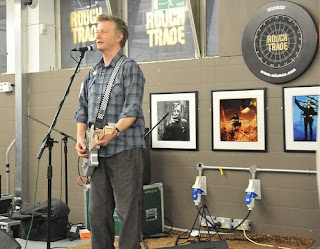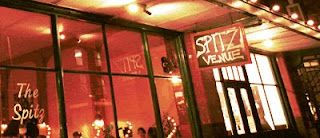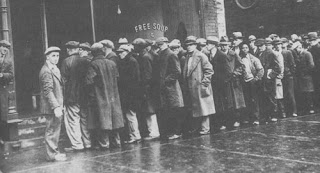 I’m ahead of time this morning having bought Sunday’s Observer at 11pm last night, giving me license for a lie in.
I’m ahead of time this morning having bought Sunday’s Observer at 11pm last night, giving me license for a lie in.Having enjoyed Billy Bragg’s short punchy set (photo from rashbre) comprising of lectures on record stores and a few classics at Rough Trade East yesterday, it’s interesting to draw parallels with his thoughts on how punk rock was discovered in the dusty corners of independent record shops, with live music venues. In music monthly today, it discusses the recent dominance of the o2 arena, but takes a brief look at the great live music venues that are either shut already or in process of doing do.
With venues like the Astoria marked for closure, & the Spitz already gone, Bragg’s dusty corner myth rings true, as we increasingly see great old decrepit live venues in decline much like the independent record store. It’s a similar state of affair in New York, with CBGB closing down in 06, and experimental jazz venue, the Tonic, favoured by Tzadik label eccentrics, levelled to make way for condos. It’s easy to see that the dusty corner is getting cleaner by the second.

But this is where the internet comes in. Perhaps Bragg missed the point when he criticised the lifelessness of instantly finding what you want, rather than leafing through hundreds of vinyl’s, as this is exactly what the internet allows you to. It has dusty corners springing up all over the place complete with spider webs and moth eaten handkerchiefs. Maybe lacking the romantic notion Bragg favours, the net does provide a forum for individuals to get their music out there, cutting out all the middle men in the process. You could argue that it also provides a greater medium for experimentation as musicians are creating for no particular audiences. Although he’s right in saying the majority is probably rubbish, he’s wrong in assuming the corporate nature of the beast. Myspace may have sold out to Microsoft, but there are hundreds of indie sites just like it waiting to be tapped into by A&R execs (if they still exist) and given the publicity they can’t provide themselves. As the artist takes increasing control of the production process (i.e. their bedroom), perhaps the future of the great labels exists in PR only.
Don’t get me wrong, I love record stores, and am concerned that following Google’s announcement to induce a bidding war for search terms, chances are the internet will become an even larger well-oiled corporate machine. However, this rapid growth will run out eventually, and when we’re all bored of staying indoors, and global warming has brought with it the ‘great British summer’ we’ll all have to return to the record shops, and the dusty corners will be swarming again.
Let’s not forget, the city is huge, and there’s still loads of dusty corners to find, and if you liken this to ever expanding genres of music, then there’s already more than enough to wade through. Post apocalyptic hardcore anyone?





